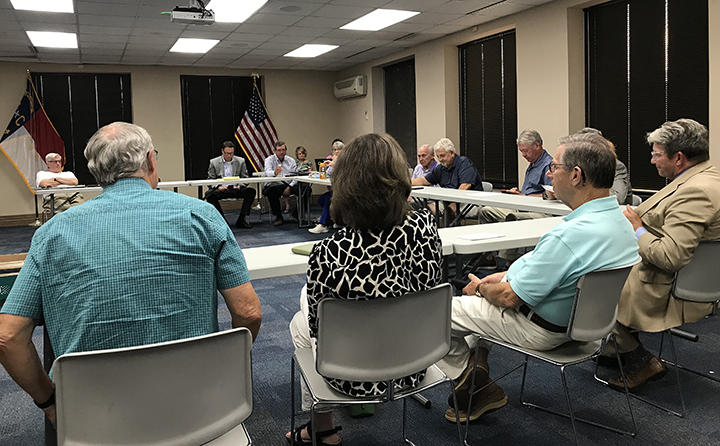Welcome!

Members of the Randolph County Commissioners and Asheboro City Council meet to come to grips with how to handle water line expansion in Randolph County. Janet Imrick/Randolph Hub
A growing issue: water
Janet Imrick
Randolph Hub
ASHEBORO — As new water lines are added to accommodate growing communities and manufacturing, Randolph County must work with the city of Asheboro to decide who owns, operates and maintains them.
That question was what brought county commissioners together for a joint meeting with the Asheboro City Council on Tuesday, Aug. 27.
“We’ve got some decisions that have to be made, some questions that need to be addressed,” County Manager Zeb Holden said. “What better opportunity than to bring everyone together, all at the same time.”
Randolph County Commissioners Chair Darrell Frye said, “Both sides have too much at risk and much to gain to not work it out together.”
Among staff in attendance were Asheboro Water Resources Director Michael Rhoney, City Manager John Ogburn and Assistant County Manager William Johnson.
Greg Flory, executive director of the Piedmont Triad Regional Water Authority (PTRWA), was also there to provide information.
Johnson gave a presentation focusing on the water and sewer line projects along three routes:
- The Highway 49 corridor toward Liberty, home of the future Toyota Battery Manufacturing.
- Along US-64 to Chatham County to support Project Wolfspeed.
- The PTRWA-to-Asheboro water line along I-73/74.
Randolph County is asking Asheboro if the transmission line along US 64 can be enlarged from 20 inches to 24 inches.
Johnson said the county also wants to know if Asheboro plans to own and operate the line or would consider signing over parts to the county.
For the PTRWA-to-Asheboro line, he asked if Asheboro would be willing to take ownership of PTRWA’s meter vault at I-74 and Heath Dairy Road.
County and city leaders agreed they should look at how to minimize the number of transactions along water lines to keep costs as low as they can.
Asheboro Mayor Pro Temp Walker Moffitt said, “The mechanics are there. We’re going to run that line out there.
“The question is who bills who?”
Johnson said Randolph County wants to use existing water and wastewater systems to foster growth. He said that the Highway 49 project could help Ramseur and Liberty improve and expand their service areas.
No formal votes or action were taken at the meeting, but council members and commissioners all agreed to have their staff and consultant agencies lay the groundwork for future interlocal and operating agreements.
The county has retained the firm Raftelis and the Wooten Company to study utility lines, while Asheboro is working with the firm HDR.
City council members asked Flory and the county about water demand and capacity, the capabilities of treatment plants, expectations for other municipalities in the county, as well as what surrounding counties might be able to contribute.
Franklinville has asked if it can receive water from the US 64 line. Asheboro Mayor David Smith said those conversations began before Wolfspeed came into the picture. Smith said, “They have some concern that they might not get water from us like we originally told them we could.”
Holden said it will also be costlier to serve both sides the river in Franklinville, but the county is looking at finding water from other sources, such as Ramseur.
Commissioner Kenny Kidd asked about Asheboro’s commitment to Wolfspeed. Rhoney answered that their agreement is for 2.8 million gallons: 1.8 million from Asheboro and another million from Siler City.
Smith asked about progress on Ramseur’s water plant. Johnson said that one of its upcoming upgrades is a switch to chlorine, which will make its water compatible with Asheboro’s and the PTRWA’s.
Ogburn compared the division of water supply to electric power. “Duke and Randolph [Electric] can’t tell you who made your power. Ramseur going to chloromides — which is also the preferred methodology — would allow us to comingle this water like electricity.”
They all agreed that wastewater infrastructure will be much more complicated. Moffitt said, “We’re having the easy talk now. Wastewater is what’s going to drive this truck. You’re talking pennies on the dollar today compared to where that’s headed.”
Both the county and the city have already taken steps to expand water services earlier this year. In February, commissioners activated the Eastern Randolph Water and Sewer District. In July, the Asheboro City Council approved a memorandum of understanding for considering membership with PTRWA.
“The jobs don’t care what basin they’re in,” Ogburn said. “We just want them bringing that money back here.”
Holden said, “The future of what we’re trying to accomplish is well out there, if we can benefit Asheboro, Randolph County, and the general population tremendously in the years to come.”
